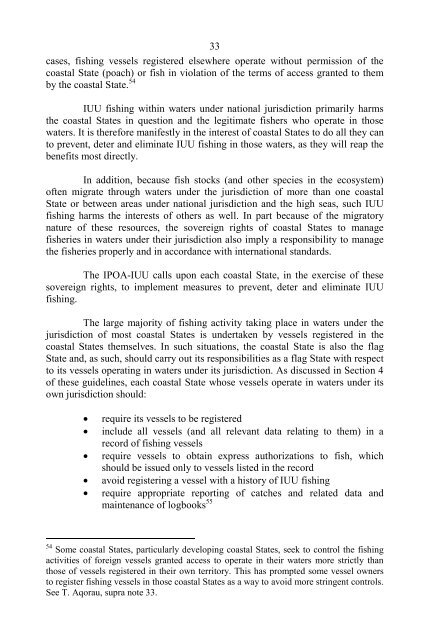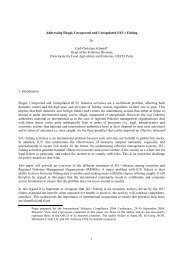33cases, fishing vessels registered elsewhere operate without permission <strong>of</strong> thecoastal State (poach) or fish in violation <strong>of</strong> the terms <strong>of</strong> access granted to themby the coastal State. 54<strong>IUU</strong> fishing within waters under national jurisdiction primarily harmsthe coastal States in question and the legitimate fishers who operate in thosewaters. It is therefore manifestly in the interest <strong>of</strong> coastal States to do all they canto prevent, deter and eliminate <strong>IUU</strong> fishing in those waters, as they will reap thebenefits most directly.In addition, because fish stocks (and other species in the ecosystem)<strong>of</strong>ten migrate through waters under the jurisdiction <strong>of</strong> more than one coastalState or between areas under national jurisdiction and the high seas, such <strong>IUU</strong>fishing harms the interests <strong>of</strong> others as well. In part because <strong>of</strong> the migratorynature <strong>of</strong> these resources, the sovereign rights <strong>of</strong> coastal States to managefisheries in waters under their jurisdiction also imply a responsibility to managethe fisheries properly and in accordance with international standards.The <strong>IPOA</strong>-<strong>IUU</strong> calls upon each coastal State, in the exercise <strong>of</strong> thesesovereign rights, to implement measures to prevent, deter and eliminate <strong>IUU</strong>fishing.The large majority <strong>of</strong> fishing activity taking place in waters under thejurisdiction <strong>of</strong> most coastal States is undertaken by vessels registered in thecoastal States themselves. In such situations, the coastal State is also the flagState and, as such, should carry out its responsibilities as a flag State with respectto its vessels operating in waters under its jurisdiction. As discussed in Section 4<strong>of</strong> these guidelines, each coastal State whose vessels operate in waters under itsown jurisdiction should:require its vessels to be registeredinclude all vessels (and all relevant data relating to them) in arecord <strong>of</strong> fishing vesselsrequire vessels to obtain express authorizations to fish, whichshould be issued only to vessels listed in the recordavoid registering a vessel with a history <strong>of</strong> <strong>IUU</strong> fishingrequire appropriate reporting <strong>of</strong> catches and related data andmaintenance <strong>of</strong> logbooks 5554 Some coastal States, particularly developing coastal States, seek to control the fishingactivities <strong>of</strong> foreign vessels granted access to operate in their waters more strictly thanthose <strong>of</strong> vessels registered in their own territory. This has prompted some vessel ownersto register fishing vessels in those coastal States as a way to avoid more stringent controls.See T. Aqorau, supra note 33.
34Paragraph 51 <strong>of</strong> the <strong>IPOA</strong>-<strong>IUU</strong> sets forth a variety <strong>of</strong> tools for eachcoastal State to use to prevent, deter and eliminate all forms <strong>of</strong> <strong>IUU</strong> fishing thatmay occur in waters under its jurisdiction, whether carried out by its own vesselsor by vessels registered elsewhere. Many <strong>of</strong> these tools are similar to measures tobe taken by flag States, summarized above. For example, paragraph 51.1 callsupon coastal States to undertake “effective [<strong>MCS</strong>] <strong>of</strong> fishing activities in the[EEZ].” As discussed in Section 3.2.5 <strong>of</strong> these guidelines, establishment <strong>of</strong>effective <strong>MCS</strong> requires a broad-based effort to monitor fishing activity,investigate possible infractions and impose appropriately severe penalties. Eachcoastal State should strengthen its <strong>MCS</strong> capacities and, in particular, shouldconsider requiring vessels operating in waters under its jurisdiction to use VMS.Similarly, paragraph 51 <strong>of</strong> the <strong>IPOA</strong>-<strong>IUU</strong> calls upon coastal States toensure that no vessel, domestic or foreign, undertakes fishing activity in watersunder its jurisdiction without a valid authorization to fish issued by that coastalState. Such authorizations should be issued only to vessels that are properlyentered on a record <strong>of</strong> vessels maintained by the coastal State.As discussed above, transshipment <strong>of</strong> fish at-sea <strong>of</strong>ten facilitates <strong>IUU</strong>fishing. For this reason, paragraph 51 also calls upon each coastal State to ensurethat both at-sea transshipment and processing <strong>of</strong> fish in waters under itsjurisdiction are either expressly authorized by the coastal State or, at a minimum,are conducted in conformity with appropriate regulations adopted by the coastalState.To assist those fishers who wish to operate legitimately, a coastal Stateshould ensure that waters under its jurisdiction are clearly marked on charts. Thecharts should also identify any protected sensitive areas where fishing isprohibited and areas limited to fishing by certain categories <strong>of</strong> fishers or types <strong>of</strong>fishing gear.5.2 Access and Access AgreementsA coastal State that does not have the capacity to harvest the totalallowable catch <strong>of</strong> fish in waters under its jurisdiction has an obligation to grantaccess to those waters to fishers from other States. 56 Determining the terms andconditions for such access, however, gives the coastal State opportunities to limitthe possibilities that foreign fishers will conduct <strong>IUU</strong> fishing in those waters. In55 For basic information on catch reporting requirements, see FAO, Guidelines forRoutine Collection <strong>of</strong> Capture Fisheries Data, FAO Fisheries Technical Paper 382, Rome1999. Among other things, these guidelines suggest procedures for verifying catch reportsfrom vessels, e.g., by comparing those reports with actual landings.56 See 1982 UN Convention, article 62.2.
- Page 4 and 5: iiiPREPARATION OF THIS DOCUMENTThe
- Page 6 and 7: vThe IPOA-IUU is voluntary. However
- Page 8 and 9: viii6.2 Examples of some port State
- Page 10 and 11: xiBACKGROUND1. From ancient times,
- Page 12 and 13: xiii11. The Code is voluntary. Howe
- Page 14 and 15: 1. INTERNATIONAL PLAN OF ACTION - I
- Page 16 and 17: 3Since the late 1990s, a number of
- Page 18 and 19: 5(1) conducted by national or forei
- Page 20 and 21: 7flag States, coastal States and Po
- Page 22 and 23: 9In light of this, the very first
- Page 24 and 25: 11the vessels rarely if ever visit
- Page 26 and 27: 13For example, Japan requires its n
- Page 28 and 29: 15IUU fishing on the high seas. 27
- Page 30 and 31: 17end all forms of government econo
- Page 32 and 33: 19developing States, 36 have introd
- Page 34 and 35: 21If the vessel is fishing on the h
- Page 36 and 37: 23registering a vessel that has a h
- Page 38 and 39: 25RFMOs have a role to play in ensu
- Page 40 and 41: 27FAO, in turn, will make available
- Page 42 and 43: 29species can be caught, what gear
- Page 44 and 45: 31Flag States are also encouraged t
- Page 48: 35light of this, paragraph 51 of th
- Page 51 and 52: 38transshipment at sea is prohibite
- Page 53 and 54: 40supported IUU fishing. For exampl
- Page 55 and 56: 42Japan prohibits port calls by tun
- Page 57 and 58: 44of a NAFO member, it must be insp
- Page 59 and 60: 46discussed in Section 7 of these g
- Page 61 and 62: 48products harvested through IUU fi
- Page 63 and 64: 50products. On the basis of that da
- Page 65 and 66: 52question, while the latter only c
- Page 67 and 68: 54States can also combat IUU fishin
- Page 69 and 70: 56RFMOs engage in IUU fishing. No s
- Page 71 and 72: 588.3 Possibilities for Further Act
- Page 73 and 74: 60resolutions calling on those memb
- Page 75 and 76: 62landings, port control, and inspe
- Page 77 and 78: 648.3.8 Actions in Response to Rema
- Page 79 and 80: 66As a result, IUU fishers often co
- Page 81 and 82: 68A number of other developed State
- Page 83 and 84: 702.4 Measures to control transport
- Page 85 and 86: 10.3 Suggested Format for Reports t
- Page 87 and 88: 74Flag States should closely contro
- Page 89 and 90: 76A coastal State should consider r
- Page 91 and 92: 78To assist States in implementing
- Page 93 and 94: 12. LITERATURE CITED80Agnew, D.J. 2
- Page 95 and 96: 82Greenpeace. 2001. Pirate Fishing:
- Page 97 and 98:
84II. NATURE AND SCOPE OF IUU FISHI
- Page 99 and 100:
86to the Conservation and Managemen
- Page 101 and 102:
National Legislation88Legislation16
- Page 103 and 104:
90National Plans of Action25. State
- Page 105 and 106:
9236.2 having taken into account al
- Page 107 and 108:
9446.3 the species, fishing gear au
- Page 109 and 110:
9651.2 cooperation and exchange of
- Page 111 and 112:
98general operating guidelines for
- Page 113 and 114:
100and should consider measures to
- Page 115 and 116:
10280.9 development of observer pro
- Page 117 and 118:
10486.3 the strengthening of region
- Page 119 and 120:
106Articles V, VI, and VII of the A
- Page 121 and 122:
1084.2 To the greatest extent pract
- Page 123 and 124:
110• Compliance with other aspect
- Page 125 and 126:
1126. Information regarding such si
- Page 127 and 128:
114Annex ACommon English Name Scien
- Page 129 and 130:
1164. Parties shall consider and ac
- Page 131 and 132:
118Committed to take steps, consist
- Page 133 and 134:
1209. An export-validated Dissostic
- Page 135:
122APPENDIX VIWEBSITES OF SELECTED
















